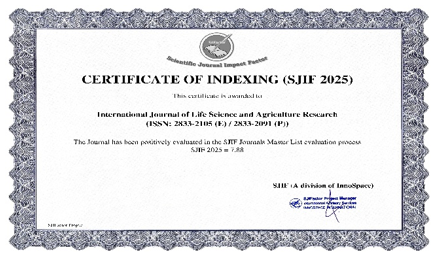Supplements Formulation from Citrus Fruit Peels and Antioxidant Rich Spices
DOI:
https://doi.org/10.55677/ijlsar/V02I06Y2023-04Keywords:
citrus, Utilization, formulation, purificationAbstract
Citrus is exceptionally vital verity of natural products incorporate orange, lemon, sweet lime, kinnow, pomelo etc. This verity expended by populace in all over world in huge amount in different froth. It is utilized by businesses and in investigate segment for making juices, jam, toffee etc. This investigate substance incorporates arrangement of supplements from the combination of citrus natural product peels and flavors. It is additionally imperative for citrus natural products peel wastage utilization. In this inquire about audit three sorts of supplements defined with distinctive combination of peels powder and flavors such as to begin with supplement is defined by natural sweet lime peels with carom oil and cardamom powder, moment supplement is defined by natural orange natural product peels with cumin seed powder and clove oil, third supplement defined by natural lemon peel powder with combination of cinnamon oil and fennel seed powder. These supplements are defined on the premise of different wellbeing impacts in human life that can diminish the chance of gastrointestinal track for blood refinement and ordinary working of body. Individuals ought to incorporate such sort of item in their schedule to diminish the chance of malady.
References
Adewole, E., Adewumi, D.F., Fadaka, J.J. 2014. Phytochemical Constituents and Proximate Analysis of Orange Peel (citrus Fruit). J. Adv. Bot. Zool., 1(3), 1- 2.
Albishi, T., John, J.A., Al-Khalifa, A.S., Shahidi, F. 2013. Phenolic content and antioxidant activities of selected potato varieties and their processing by- products, J. Funct. Foods, 5: 590–600.
Amitava, D., Kimberly, K. 2014. Chapter 15 – Antioxidant vitamins and minerals. Antioxidants in Food, Vitamins and Supplements, 277-294.
AOAC. 2005.Official Methods of Analysis, 18th ed. Association of Official Analytical Chemists AOAC International, Gaithersburg, MD, USA
Bampidis, V.A., Robinson, P.H. 2006. Citrus by-products as ruminant feeds: a review. Anim. Feed Sci. Technol., 128 (3-4): 175- 217.
Bocco, A., Cuvelier, M.E., Richard, H., Berset, C. 1998. Antioxidant activity and phenolic composition of citrus peel and seed extracts. J. Agric. Food Chem., 46(6): 2123
Bravo, L. 1998. Polyphenols: Chemistry, dietary sources, metabolism, and nutritional significance. Nutr. Rev., 56(11): 317-333.
Cabral de Oliveira, A., Valentim, I. B., Silva, C.A., Bechara, E.J.H., Paes de Barros, M., Mano, C.M., Goulart, M.O.F. 2009.Total phenolic content and free radical. Chem., 115: 469-475.
Cai, Y., Luo, Q., Sun, M., Corke, H. 2004. Antioxidant activity and phenolic compounds of 112 traditional Chinese medicinal plants associated with anticancer. Life Sci., 74(17): 2157-2184.
Casquete, R.; Sonia M. C.; Martín, A.; Ruiz- Moyano, S.; Saraiva, J. A.; María G. C. and Paula, T. 2015.Evaluation of the effect of high pressure on total phenolic content, antioxidant and antimicrobial activity of citrus peels. Innovative Food Science and Emerging Technologies, 31: 37-44.
Chedea, V. S., Kefalas, P., Socaciu, C. 2010. Patterns of carotenoid pigments extracted from two orange peel wastes (valencia and navel var.). J. Food Biochem., 34: 101-110.
Cooper, D.A., Eldridge, A.L., Peters, J.C.1999. Dietary carotenoids and certain cancers, heart disease, and age-related macular degeneration: a review of recent research, Nutr. Rev. 57(7): 201-214. doi:10.1111/j.1753-4887.1999
Delia–Gabriela, D., Nicoleta-Gabriela, H., Daniel, I. H., Camelia, M., Diana, R. 2010. Determination by RP-HPLC of β- carotene concentration from orange (Citrus sinensis L.) fruits peel extracts. J. Agro aliment. Processes Technol., 16 (2): 242-246. 17. Di Mauro, A., Fallico, B., Passerini, A., Rapisarda, P., Maccarone,
E.1999.Recovery of hesperidin from orange peel by concentration of extracts on styrene-divinylbenzeneresin. J. Agric. Food Chem., 47: 4391












